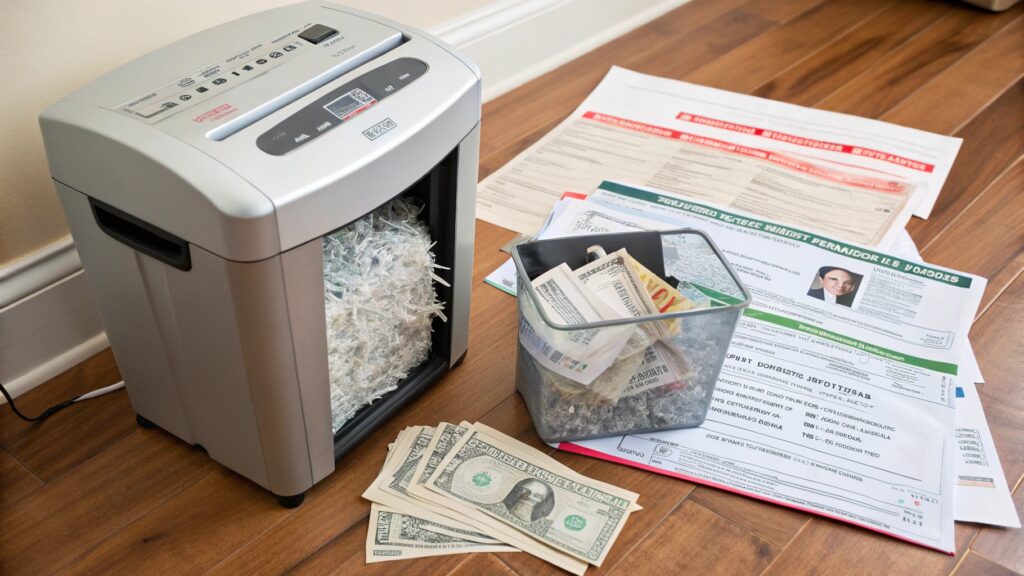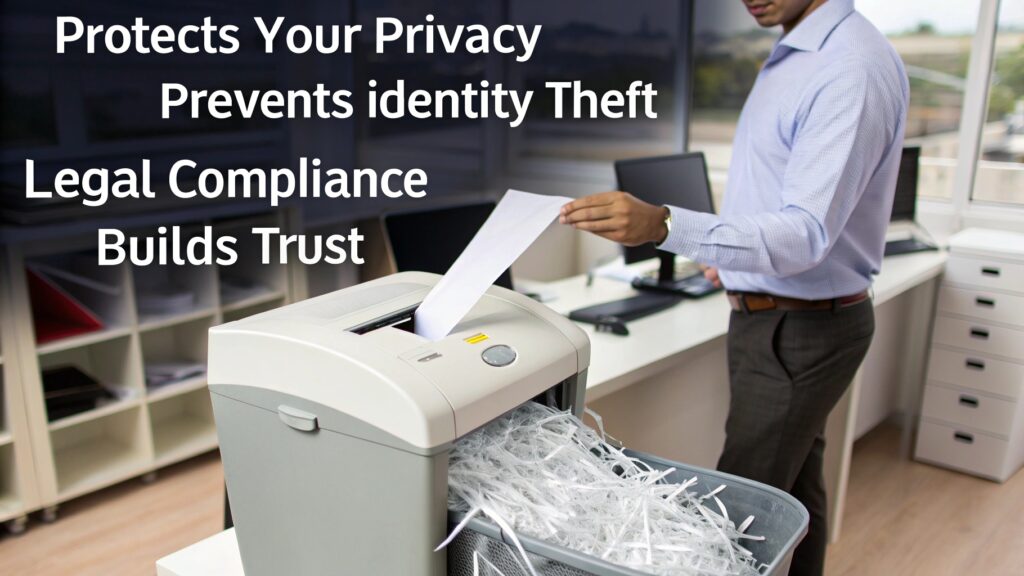In today’s digital and paper-heavy world, the threat of identity theft, fraud, and data breaches is very real. One of the most effective ways to protect sensitive information is through confidential documents shredding. This process ensures that personal, financial, medical, or legal documents are destroyed beyond recovery.
For people and businesses in the United States, understanding and using secure shredding methods isn’t just smart—it’s essential. In this comprehensive article, we will explore everything you need to know about confidential documents shredding in a simple, human, and helpful way.
What is Confidential Documents Shredding?
Confidential documents shredding refers to the systematic and secure destruction of documents that contain sensitive, private, or legally protected information. This process ensures that the information contained within these documents cannot be accessed, misused, or reconstructed once destroyed.
These documents might include personal data, business transactions, healthcare records, financial information, legal contracts, and more. Proper shredding protects individuals and organizations from threats like identity theft, fraud, corporate espionage, and regulatory penalties.
The process is often carried out using industrial-grade shredders that cut documents into tiny, unreadable fragments. Professional shredding services follow strict compliance protocols and offer secure handling, collection, destruction, and often recycling of the materials.
Also Read: Computer Recycling – A Complete Guide!
Why Is Confidential Document Shredding Important?

Protects Your Privacy:
Personal or business documents often hold details that should remain private. Shredding keeps your information safe from prying eyes.
Prevents Identity Theft:
Thieves can dig through trash to find documents with personal details. Shredding ensures they find nothing useful.
Legal Compliance:
Laws like HIPAA, FACTA, and GLBA require proper disposal of sensitive data. Non-compliance can lead to fines or lawsuits.
Builds Trust:
Clients and customers trust businesses that take information security seriously. Shredding helps maintain that trust.
When is the right time to shred documents?
The right time to shred documents is when they are no longer required for legal, financial, or personal purposes. For instance, tax documents should be kept for at least seven years, while utility bills, bank statements, and medical records can usually be shredded after a few months or once verified.
Expired items like ID cards, credit cards, or insurance papers should be shredded immediately to avoid identity theft. Establishing a regular shredding schedule helps maintain security and prevents unnecessary clutter.
Shredding old files also frees up storage space and ensures you’re not holding on to sensitive information longer than necessary. It’s a smart habit for both households and businesses to minimize risk and stay organized.
Must Check: Computer Recycling Leicester – Safe Data Wipe & Fast Service!
What Kind of Documents Need Shredding?

- Personal Identification Documents: Passport copies, national ID cards, Social Security numbers, driver’s licenses, birth and marriage certificates (expired copies or scanned versions)
- Financial and Tax Records: Bank statements, credit card statements, loan documents, investment reports, tax returns and supporting documents
- Medical and Health-Related Records: Patient files and charts, insurance claims, medical prescriptions, test results, appointment notes and billing records
- Legal and Government Documents: Contracts and NDAs, court orders and case files, licenses and permits, legal correspondences, immigration and visa paperwork
- Employee and HR Documents: Payroll information, employment applications, background checks, disciplinary records, resumes and performance evaluations
- Client and Customer Data: Invoices and billing details, contact information, purchase history, signed agreements, feedback and survey forms
- Internal Business Documents: Strategic plans, internal reports, meeting notes, product designs, intellectual property (IP) documentation
- Educational and Student Records: Transcripts, applications, disciplinary actions, attendance and performance records
- Marketing and Research Documents: Survey results, market analysis, customer profiling data, email or print campaign lists
Types of Shredding Methods!
| Method | Description | Security Level | Ideal For |
| Strip-Cut Shredding | Cut paper into long, vertical strips. | Low | Non-sensitive internal documents |
| Cross-Cut Shredding | Cuts paper both horizontally and vertically into small particles. | Medium to High | General office documents |
| Micro-Cut Shredding | Produces confetti-like micro pieces. | Very High | Legal, financial, and medical documents |
| Pierce-and-Tear | Shredder uses rotating blades to tear paper apart. | High | Industrial or bulk shredding operations |
| Disintegration | Reduces paper to dust-like particles through repeated grinding. | Maximum | Top-secret government or military records |
| Pulping | Soaks paper in water and chemicals, turning it into pulp before recycling. | High | Eco-conscious destruction and recycling |
| Burning (Incineration) | Complete destruction via fire; typically used for classified or outdated formats. | High to Maximum (Unrecoverable) | Emergency disposal or highly classified info |
Who Uses Shredding Services?
- Small and Medium-Sized Businesses (SMBs): Often handle employee records, financial statements, and customer data. Shredding helps them maintain compliance and avoid data breaches.
- Large Enterprises and Corporations: Require frequent and bulk shredding due to high volumes of paperwork, including HR documents, contracts, and internal strategies. These organizations often use scheduled or on-site shredding services.
- Healthcare Providers and Facilities: Hospitals, clinics, and private practices use shredding to dispose of patient records in accordance with HIPAA regulations and to protect patient privacy.
- Legal Firms and Courts: Lawyers, legal consultants, and judicial offices shred legal documents, case files, contracts, and privileged communications to uphold attorney-client confidentiality.
- Financial Institutions: Banks, credit unions, insurance companies, and accounting firms destroy financial records, account statements, and client information to comply with data protection laws and industry standards.
- Educational Institutions: Schools, colleges, and universities must shred documents related to students, faculty, and administration, such as grades, disciplinary records, and admission files.
- Government Agencies and Military Offices: Deal with classified and sensitive information that requires the highest levels of security and often specialized shredding protocols.
- Remote and Home-Based Professionals: With the rise of remote work, individuals who handle printed contracts, client notes, or personal records at home increasingly rely on residential shredding services.
- Nonprofits and NGOs: Frequently manage donor lists, funding reports, internal memos, and volunteer records that need confidential disposal.
- Retailers and E-commerce Businesses: Handle customer receipts, return forms, and inventory documents that include identifiable or proprietary information.
Recent Post: Computer Recycling London — Top Rated Services!
What is the best way to destroy confidential documents?
Shredding confidential documents isn’t just about getting rid of old papers—it’s about protecting what matters most. Whether it’s a Social Security number, a financial statement, or a patient file, every document contains a piece of your personal or professional identity. If this information falls into the wrong hands, the consequences can be serious.
That’s why shredding is more than a task—it’s a responsibility. By making document destruction a regular habit, you not only protect yourself from fraud and data leaks but also build trust with clients, customers, and partners who count on you to keep their information safe.
Related Post: Certified Data Destruction – Top Methods, Tools & Compliance Tips!
FAQs:
What is the safest shredding method?
The safest shredding method is micro-cut shredding. It slices paper into tiny, confetti-like particles that are nearly impossible to piece back together. This method offers the highest level of security for sensitive documents and is ideal for confidential information.
How long should I keep old documents?
You should keep tax documents for at least 7 years, as the IRS can audit within that time. Medical and legal documents should be kept as long as they are active or relevant. Expired ID cards, credit cards, and utility bills should be shredded immediately to prevent identity theft.
Can I shred documents at home?
Yes, you can shred documents at home using a personal shredder for small amounts of paperwork. However, for large volumes, business compliance, or data protection laws, it’s safer to hire a professional shredding service. They also ensure secure disposal and provide certification.
Are shredded papers recycled?
Yes, most professional shredding companies recycle the shredded paper afterward. Once the paper is destroyed, it’s sent to recycling facilities where it’s turned into new paper products. This process is eco-friendly and reduces waste in landfills.
Do I need to remove staples or paperclips?
No, you don’t need to remove staples, paperclips, or even binder clips before shredding. Industrial shredders used by shredding companies are built to handle these items. This saves time and makes the shredding process much more convenient.
Conclusion:
Confidential documents shredding is not just a routine task—it’s a vital step in protecting your identity, privacy, and peace of mind. Whether you’re an individual or a large business in the U.S., taking shredding seriously means taking responsibility for your information.
With strict laws and rising threats, secure document destruction is no longer optional—it’s a necessity. Choose the right shredding method, partner with a trustworthy service, and stay compliant, safe, and environmentally responsible.
Latest Post:


